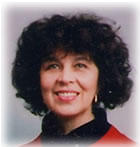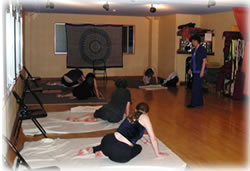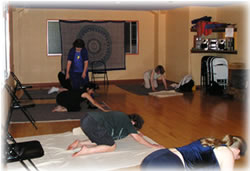 |
 |
 |
 |
 |
 |
 |
Awareness Through Movement and Functional Integration
Explorations in Feldenkrais Method with Roz Brown
Feldenkrais Method is a unique and sophisticated approach to human understanding and improvement. Its magic lies in a remarkable quality to access the nervous system’s own innate capacity to change and grow. The method is renowned for ite ability to improve posture, flexibility and human functioning and to alleviate muscular tension and pain.
The genius of the method is the use of physical movement to focus learning at the juncture of thought and action. Sensory motor ability is utilized to free us from habitual patterns and allow for new healthy patterns of moving feeling and thinking.

Roz
Brown
Awareness Through Movement (ATM) are group lessons which are verbally directed involving highly sophisticated movement sequences which directly engage our natural intelligence in a gentle and pleasurable way. ATM accesses the sensory motor processes of the brain and coordinates attention, perception, imagination and cognition. There is no stretching or use of strength as it is a learning process and not a physical exercise.
The body becomes more supple than most people would have believed possible and is experienced as almost weightless yet just when it seems the lightest, it is strongest and able to move fastest.
As the joints are freed there is an increase in speed, fluidity and ease of movement.
Functional Integration (FI) are one-on-one lessons which are personally tailored to meet the students needs and involve very gentle manipulation leading to softness and sometimes a profound release of tension.
Roz Brown is a certified Feldenkrais practitioner having graduated from the first Japan Feldenkrais training taught by Eilat Almagor, student and close personal friend of the late Dr. Moshe Feldenkrais.
Roz currently is serving on the Japan Feldenkrais guild board of directors and teaches ATM in Meguro and Ogikubo, giving FI home visits in the Tokyo/Yokohama area.
CONTACT ROZ TO FIND OUT ABOUT THE LATEST CLASSES AND PRIVATE SESSIONS Phone: 044-935-6309 or Email: rozaligned@hotmail.com
The Language of Movement: A Dialog of Brain and Body for WELL
The Feldenkrais Method, well known in the west as a holistic approach to the re-education of body use and function, is attracting increasing interest in Japan. A second 4-year training course is underway. The first Japan training produced a group of 70 practitioners skilled in many fields - medicine and physical therapy, dance, theatre, music and sport.
"We call ourselves teachers, rather than therapists," says Roz Brown, one of the first graduates. “Although it is therapeutic, what we do is basically a form of education.” Roz combines language teaching in kindergarten with Feldenkrais work, helping people improve their body functioning through group and individual lessons.
In group lessons, known as "Awareness through Movement"(ATM), the student is guided to notice the condition of the body and, by exploring the effects of making various movements, which are often quite subtle, the brain begins to notice changes as they take place in the body. The focus is on the students exploring possibilities for movement in their own bodies rather than having a therapist manipulate them. The movements are usually done lying on the floor. "The effects of gravity are minimized and the musculature can rest in a neutral state more easily. This makes it possible to isolate and separate the elements of our movements", explains Brown. "The major difference with Feldenkrais work is the extremely subtle nature of the stimulus we work with," she adds. "The lightest possible stimulus is given because that is how the nervous system wakes up, and how change can be made."
"Rosalind's FIs
are superb. They've been wonderfully helpful in assisting me in
overcoming severe chronic pain. I feel so much
freer and at home in body after a session with Roz. She's truly a
gifted
teacher Kate Brady |
 |
 |
"Our individual patterns of body use involve complex networks of small muscle movements that kick in at the sub-conscious level. To explore new ways of using the body we need to come down to the level of the tiniest movements, even to the point where the signal goes from the brain to the muscle. We often work in the imagination only. We also work with unfamiliar movements. By playing with movements we don’t normally make, the nervous system is given a gentle nudge to pay more attention!"
People may turn to bodywork due to pain and discomfort or lack of movement after an accident. Many are looking to improve their functioning in sport, performance arts and other occupations requiring effective use of the body and voice. Awareness is the key according to Brown. " We all have areas we would like to improve, but we don’t really know what it is that we do that creates the problems we experience. Without that key we will re-create our problems over and over."The net result is a menu for change. "In the quiet of a lesson we allow ourselves to discover something new about how we move and how we could move. The experience of feeling our bodies differently gives new options, sometimes conscious but often an organic process that arises out of the learning process. Once presented with these options, the brain will reprogram the nervous system to select a more comfortable way. This is the meaning of awareness through movement."
"ATM lessons promote a feeling of well-being and lightness," she continues. "Genuine relaxation arises when muscle tonus is spread evenly over the entire body, rather than certain parts being held rigidly while others do all the work. We don’t tell the students how to BE or how to FEEL. Much of this learning takes place on a deeper level. Feldenkrais constructed his lessons craftily, to increase awareness at a very subtle level as well as at the gross level."
"Exploring movement is just like playing with a new language. When you learn French you may play around with the famous shoulder shrug, or spreading the hands expressively. Successful language learners do this instinctively. The gestures are part of the language, and help to get the language wired into the brain. It certainly gets the learner more accepted by native speakers."
"Foreigners in Japan may explore the language of bowing and other gestures, and we can do just the same for the language of walking comfortably, or standing and sitting gracefully, or carrying things with less strain. Adjusting to our environment as we grow means that many people become locked into fixed and habitual patterns that are often no longer appropriate. We stop exploring; but we can learn to explore again, just as young children do.
The good news is that it’s never too late to change and grow. "Neuroplasticity is a big topic these days, the ability of the brain to reprogram itself, and I think that most people would agree that motivation coupled with awareness is a powerful recipe for change, regardless of age.."
Recent brain research is giving the same message. Small children do an astounding amount of learning, all by observation, exploration and trial and error, none of it "taught" in the conventional sense. Many scientists are convinced that we need to learn more from the processes by which the child learns to organize itself in its early environment.
Roz came to Feldenkrais work through her study of yoga. "I had suffered muscle tears and was actually becoming stiffer, despite all my efforts. A few lessons with a Feldenkrais teacher helped me release deep tensions with no pain. I was impressed, of course. When I started the training I became fascinated by Feldenkrais’s analytical way of looking at movement from every angle, taking it apart, exploring each part and then putting it back together again.”
"Change never takes place by effort and aiming for perfection." Brown insists. “The saying “Practice makes Perfect” should be changed to “Patience makes Progress”, but the patience is not suppressed frustration held in check. It’s more like enlightened and detached observation.”
The Feldenkrais Method is used in helping stroke victims, children born with disabilities and people suffering from debilitating accidents. It can, says Brown, help us all to “live more comfortably in our skins. In a Feldenkrais lesson the students learn how to recognize their own comfort level. They learn to stop going too far and to trust their own reactions. This means taking responsibility for your own learning. When we say the method is a kind of education, it is in essence about how to learn. That is the most important and empowering kind of learning.”
Moshe Feldenkrais, a Russian physicist, taught in the 70s and 80s when so many developments were made in body and mind work. He interacted with many other revolutionary thinkers, like F.M. Alexander, Margaret Mead and Milton Erickson. He was both a pioneer and an eclectic all-rounder, drawing on his background in physics and mechanics, and his advanced skill in Judo and Jujitsu, to refine his method of developing human potential. To Feldenkrais fans, the world is only now waking up to the implications of his work.
Roz Brown sums up the essence of this fascinating method, “For me, personally, the changes have been dramatic but it has not been a deliberate external process. The change has come from inside, from developing better kinesthetic sense. The awareness we are talking about is integrated and not on the level of a conscious decision of will. The Feldenkrais Method talks to the brain, not the muscles, and shows how, by exploration and by not trying to do something well, we can create a space for ourselves where we are free.”CONTACT ROZ TO FIND OUT ABOUT THE LATEST CLASSES AND PRIVATE SESSIONS Phone: 044-935-6309 or Email: rozaligned@hotmail.com
"Roz
has a really creative way of presenting and leading in an ATM lesson.
She uses her voice to great effect - a few gentle suggestions
lead the way easily into the process of exploring the here and
now of one's state of being, leaving behind all the demands and
concerns
of the outside world. Exploring becomes fun, always with a light
and humorous touch. Great creative imagery - very poetic at times!
Over
the past few years every ATM lesson with Roz has been of tremendous
value for me in learning to be more at peace in mind and body -†moving
closer towards being the way I want to be, leaving tensions behind
and finding new ways of moving and living. The lessons have been
a kind of oasis for me. In FI work too Roz has a very sensitive
touch, never intrusive or overbearing. Some changes come very quickly
and
lightly, but there is much work that needs time and patience and
repetition
(I spent so long creating my own blocks and problems!) The way
of working lightly with attention but without trying to achieve
results
has taken
me many years to understand. Getting there has been fun." |
Home
•
Naturopath •
Aromatherapist •
SHOPPING ONLINE • Contact
Us
Healers,
Teachers & Creative People • Magazine
- Online • Useful
Info
Meditation,
Mantras & Prayer • Vegetarian
Info • Famous
Vegetarians •
Links
